1. How are the amendment processes of the U.S. and Florida Constitutions similar?
* Both U.S. and Florida amendments can be approved by state legislature action.
* Both U.S. and Florida amendments can be proposed by the legislature.
* Both U.S. and Florida amendments are approved directly by citizens.
* Both U.S. and Florida amendments can be proposed by citizens.
Both U.S. and Florida amendments can be proposed by the legislature.
2. How does the Florida Constitution differ from the U.S. Constitution and its amendments?
* The Florida Constitution does not have an amendment process, but the U.S. Constitution includes a process to amend it.
*The U.S. Constitution does not address the topic of education, but the Florida Constitution addresses the topic of public education.
* The Florida Constitution does not include a declaration of individual rights, but the U.S. Constitution was amended to include a bill of rights.
* The U.S. Constitution establishes three independent branches of government, but the Florida Constitution does not address the division of power.
The Florida Constitution does not include a declaration of individual rights, but the U.S. Constitution was amended to include a bill of rights.
3. Read the following statement and answer the question below. The U.S. and Florida Constitutions cover many of the same topics. Which topic is only covered in the Florida Constitution?
*taxes
*education
*court systems
*branches of government
What is education
5. Read the following scenario and answer the question below.
A band of foreign revolutionaries has attacked a U.S border town. Which governmental entity has the obligation to respond to this incident?
* The public, because it has a legal obligation to protect civilians.
* The local police, because they have a legal obligation to defend the town.
* The state, because it has a constitutional obligation to protect its citizens.
* The federal government, because it has a constitutional obligation to defend the country.
What is... The federal government, because it has a constitutional obligation to defend the country.
7. Which function of government is a state responsibility?
*enforcing treaties
*regulating immigration
* providing veteran benefits
* setting educational standards
What is ... setting educational standards
8. Which government services or obligations are provided by state governments?
* postal service and national parks
* trash collection and fire protection
* fishing licenses and driver's licenses
* buses and emergency medical services
What is... fishing licenses and driver's licenses
9. How are the legislative and executive branches of the U.S. government different from each other?
* The legislative branch enforces the laws, and the executive branch interprets the laws.
* The legislative branch interprets the laws, and the executive branch enforces the laws.
* The legislative branch makes the laws, and the executive branch interprets the laws.
* The legislative branch makes the laws, and the executive branch enforces the laws.
What is ...The legislative branch makes the laws, and the executive branch enforces the laws.
10. Which statement explains why the U.S. Constitution requires the president to give a State of the Union address to Congress?
* Congress and the president must consult each other because both branches play a role in making a law.
* Congress must request funding for its programs from the president at the beginning of the year.
* Congress can communicate directly with the president only at the beginning of a new year.
* Congress cannot pass any laws without the approval of the president.
What is... Congress and the president must consult each other because both branches play a role in making a law.
Define enumerated powers
What are powers specific powers listed in the constitution
11. Which action distinguishes the legislative branch from the judiciary branch of government?
* It gives orders to the armed forces.
* It writes bills that may be passed into law.
* It reviews laws to determine constitutionality.
* It pardons people convicted of federal crimes.
What is... It writes bills that may be passed into law.
12. Which statement describes the reserved powers of government?
* powers that are shared by the state and federal governments
* powers that are not subject to checks and balances
* powers that are not defined by law
* powers that are exercised by the states
What is... powers that are exercised by the states
16. Which constitutional principle maintains that laws and treaties made by the national government take precedence over state laws?
A. separation of powers
B. enumerated powers
C. supremacy clause
D. federalism
What is... supremacy clause
17.Which right can be denied to the citizens of Florida?
*the right to vote
* the right to a trial by jury
* the right to assemble
* the right to free speech
What is ... the right to vote
19. Which level of government provides the most services to citizens?
* local
* state
* federal
* national
What is... local
Read the following information and answer the question below.
Education is primarily a State and local responsibility in the United States. It is States and communities, as well as public and private organizations of all kinds, that establish schools and colleges, develop curricula, and determine requirements for enrollment and graduation. The structure of education finance in America reflects this predominant State and local role. Of an estimated $1.15 trillion being spent nationwide on education at all levels for school year 2011-2012, a substantial majority will come from State, local, and private sources….That means the Federal contribution to elementary and secondary education is about 10.8 percent, which includes funds not only from the Department of Education (ED) but also from other Federal agencies, such as the Department of Health and Human Services’ Head Start program and the Department of Agriculture’s School Lunch program.
How can the executive branch of the federal government influence states to change their education policies?
* The executive branch can enforce laws on what schools must teach that the state governments have to follow.
* The executive branch can put pressure on state governments by withholding federal money from schools.
* The executive branch can appoint members to the state boards of education.
* The executive branch can seize control of low-performing schools.
What is... The executive branch can put pressure on state governments by withholding federal money from schools.
4. Read the following excerpt and answer the question below.
This Constitution, and the laws of the United States which shall be made in pursuance thereof; and all treaties made, or which shall be made, under the authority of the United States, shall be the supreme law of the land; and the judges in every state shall be bound thereby, anything in the Constitution or laws of any State to the contrary notwithstanding. -Article VI, U.S. Constitution Source: National Archives Based on the excerpt, which statement explains the relationship between the Florida Constitution and the U.S. Constitution?
* The Florida Constitution cannot overrule anything that is in the U.S. Constitution.
* The U.S. Constitution and the Florida Constitution both equally apply to citizens of Florida.
* The Florida Constitution applies to citizens of Florida wherever they are in the United States.
* The U.S. Constitution applies to all the other states and the Florida Constitution only applies to Florida.
What is ... The Florida Constitution cannot overrule anything that is in the U.S. Constitution.
6. 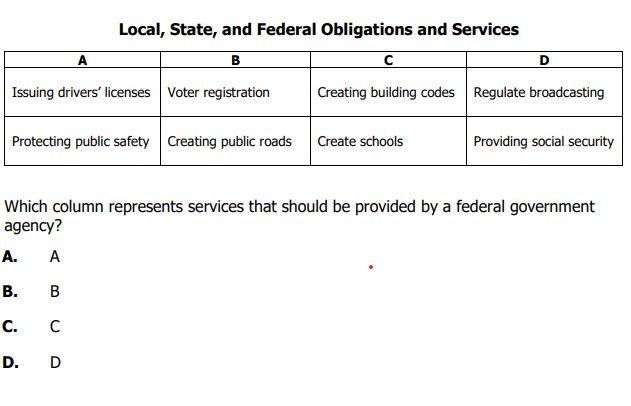
What is D.
I lost my trial at the district court and want another chance I will file an appeal at which court?
(Hint: Court above the district courts)
What is Court of Appeal
13. 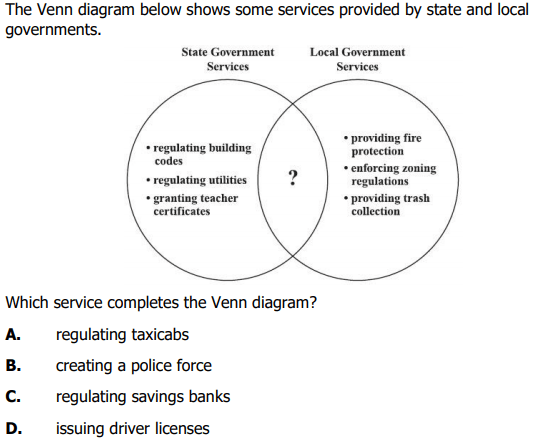
What is B.
14. 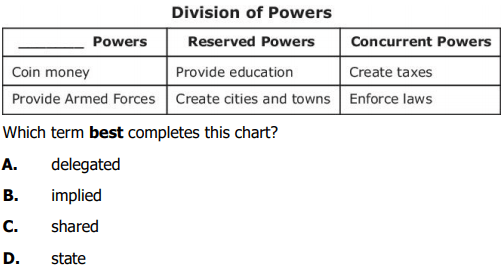
What is A.
The President can be removed by Congress - This is know as...
What is Impeachment
18. 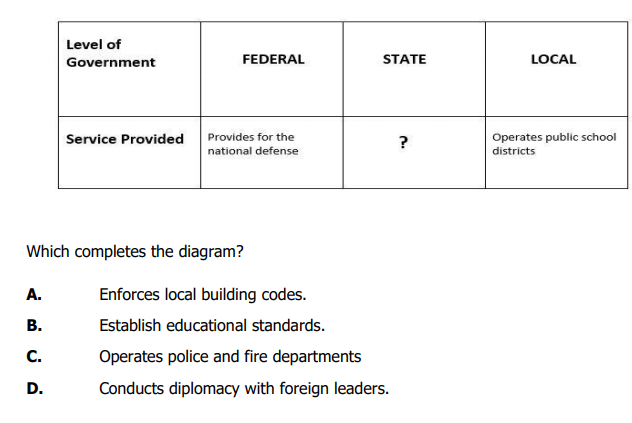
What is B.
Define Judicial Review
What is the power to declare laws unconstitutional
Powers listed in the constitution for the president
(Presidential Powers)
What are Expressed powers
20. 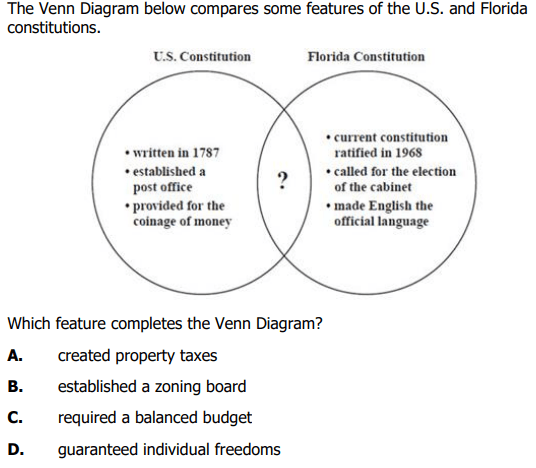
What is D.